Patent Attorney Resume Examples

Jul 18, 2024
|
12 min read
"Master the art of crafting your patent attorney resume: Secure your spot in the legal field with these expert tips for highlighting your skills, accomplishments, and innovation."
Rated by 348 people
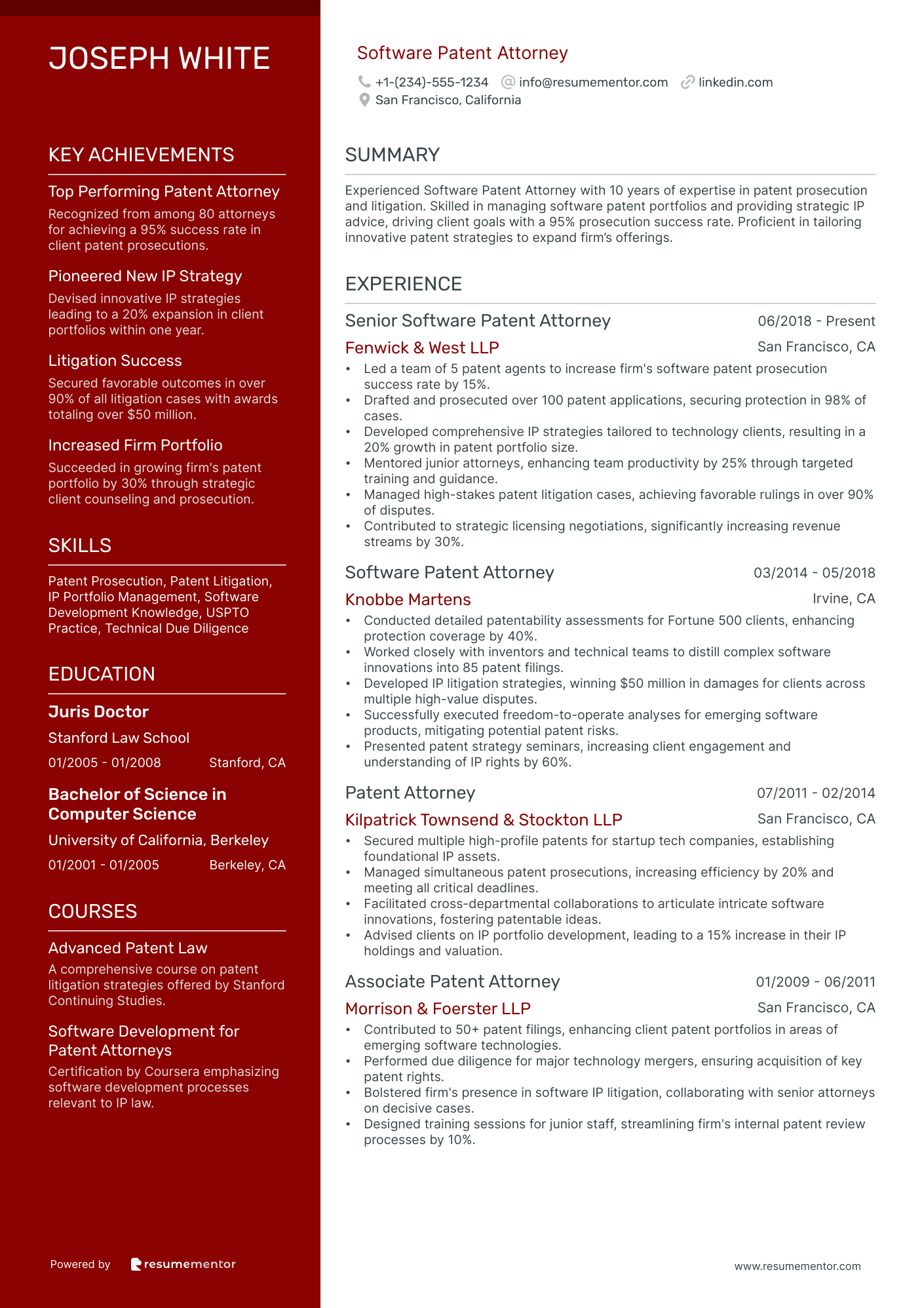
Software Patent Attorney
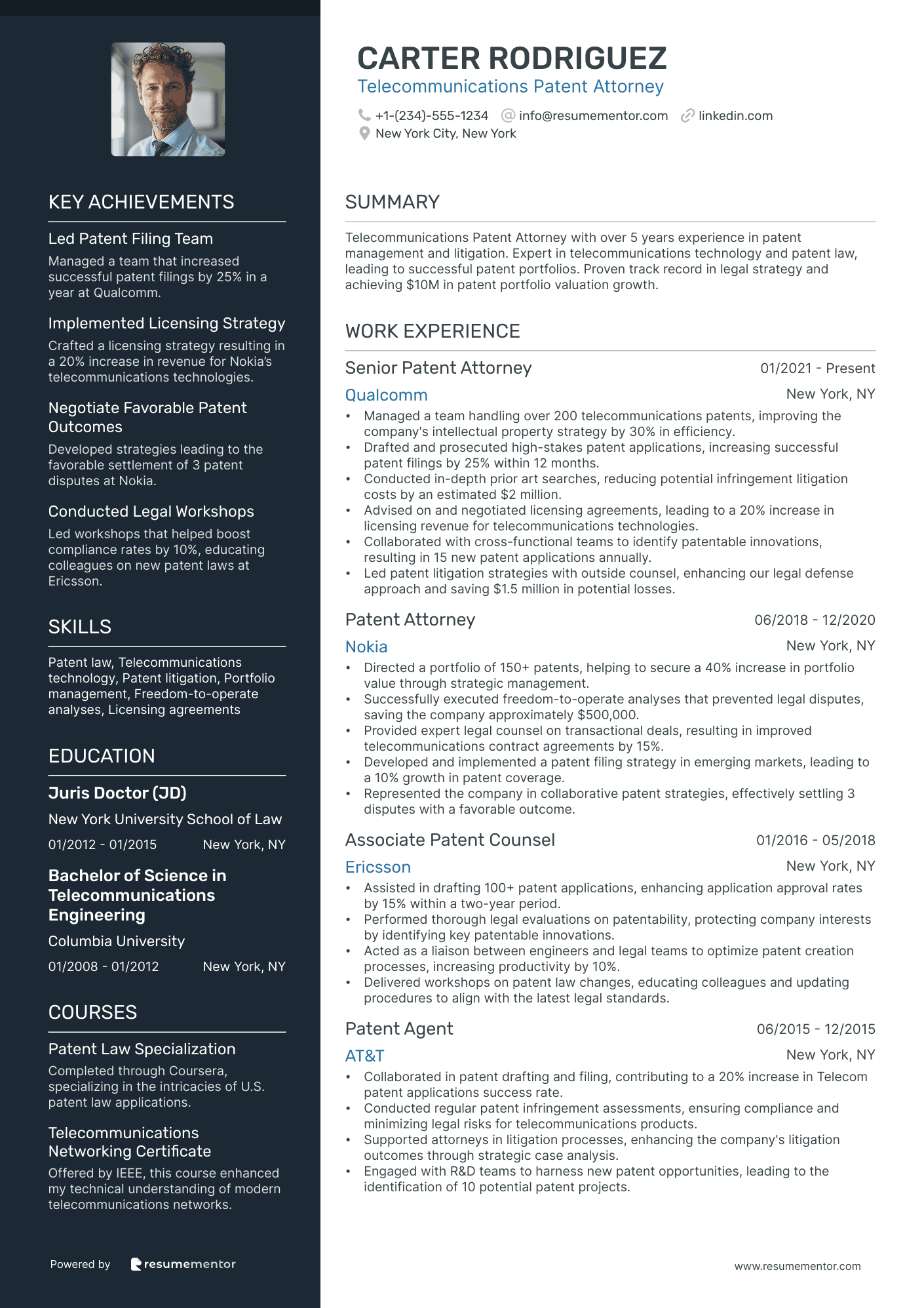
Telecommunications Patent Attorney
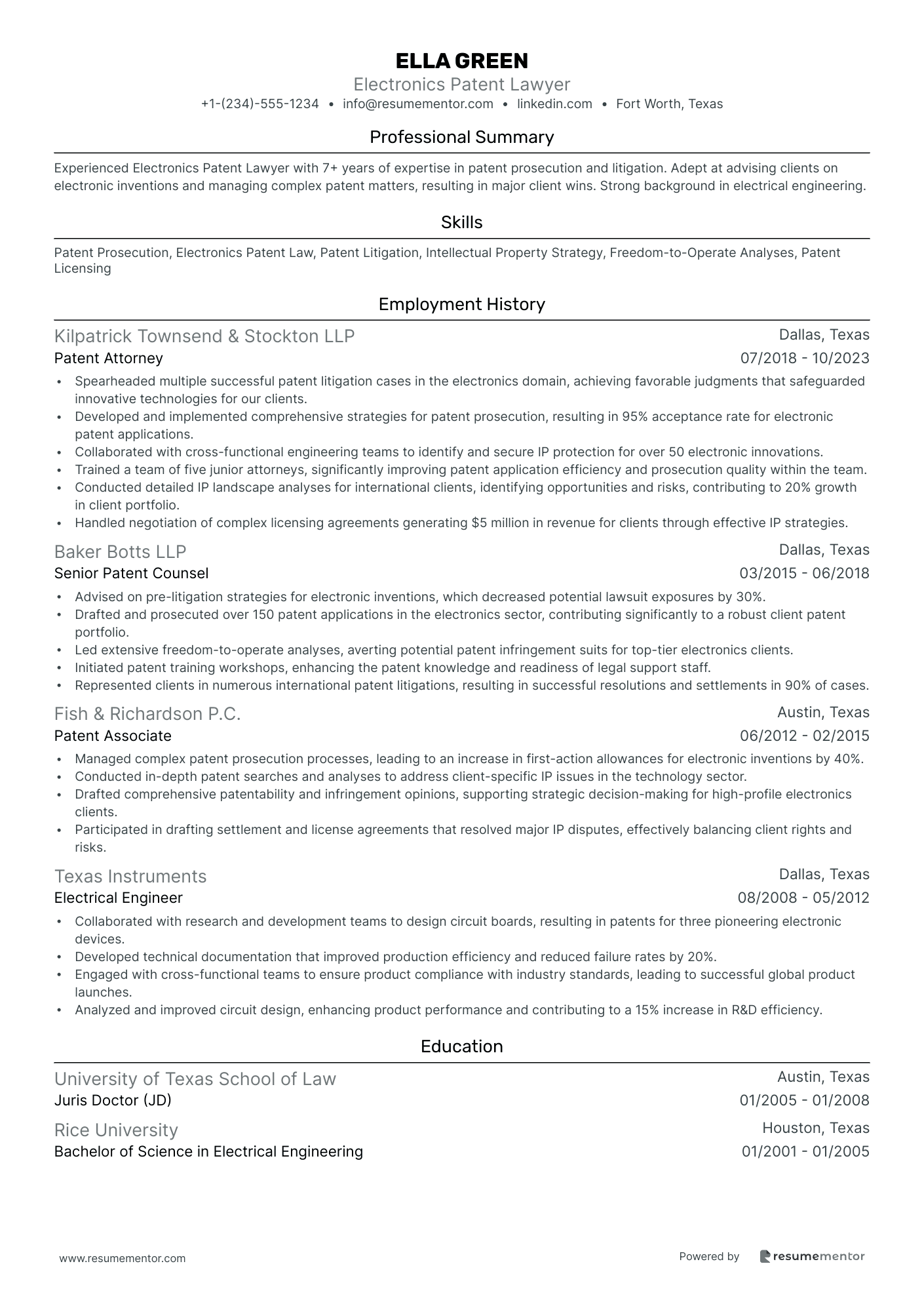
Electronics Patent Lawyer
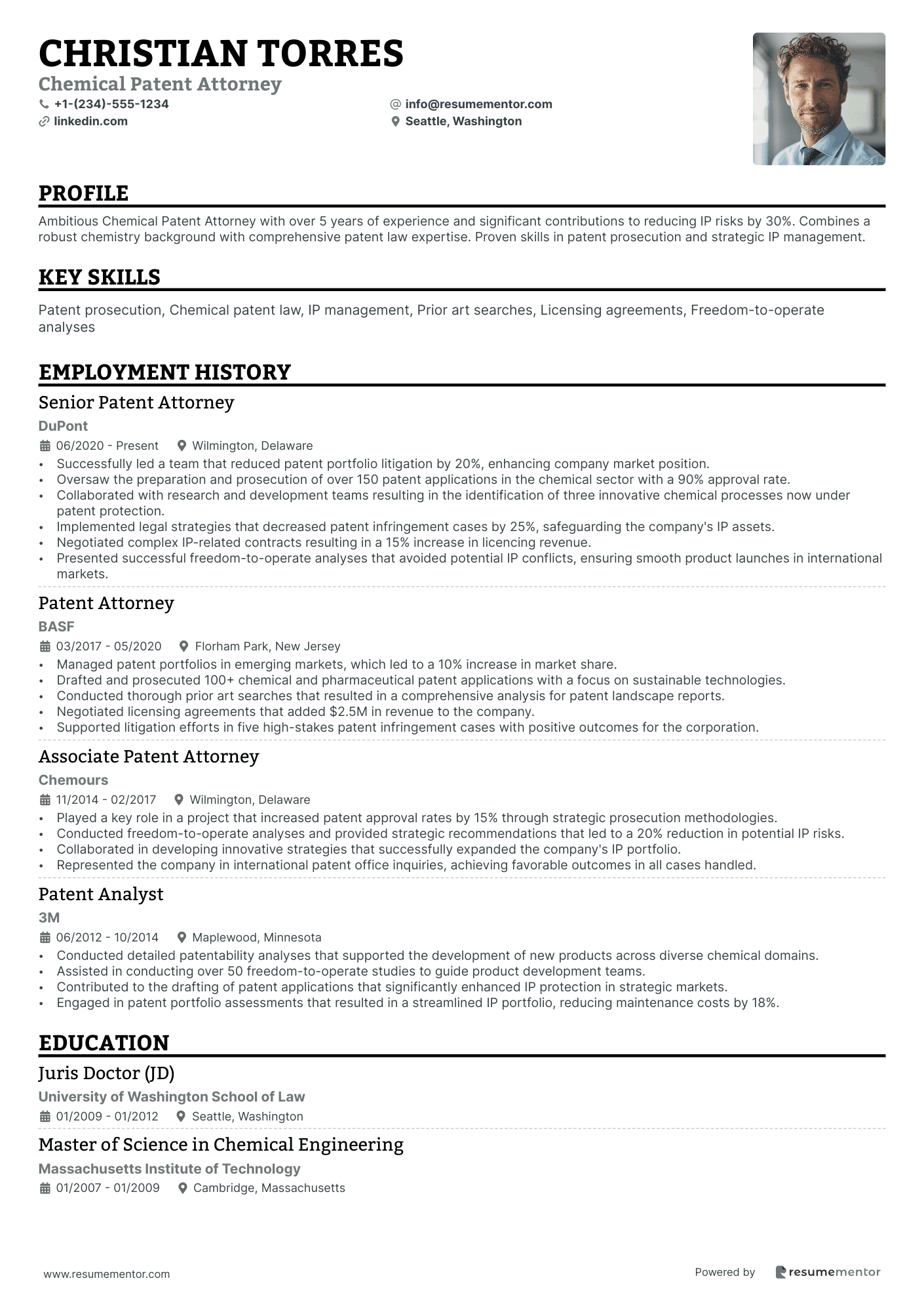
Chemical Patent Attorney
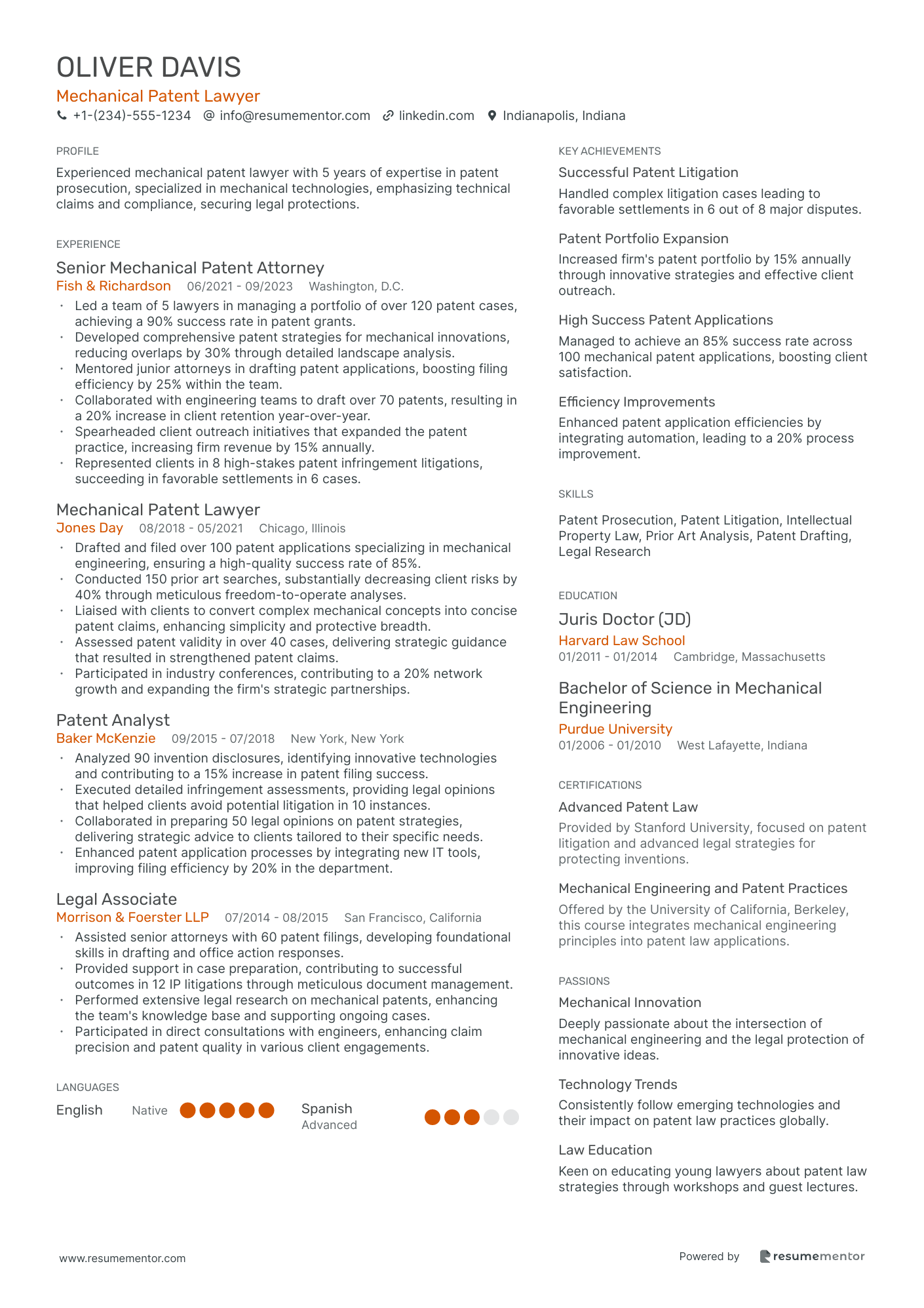
Mechanical Patent Lawyer
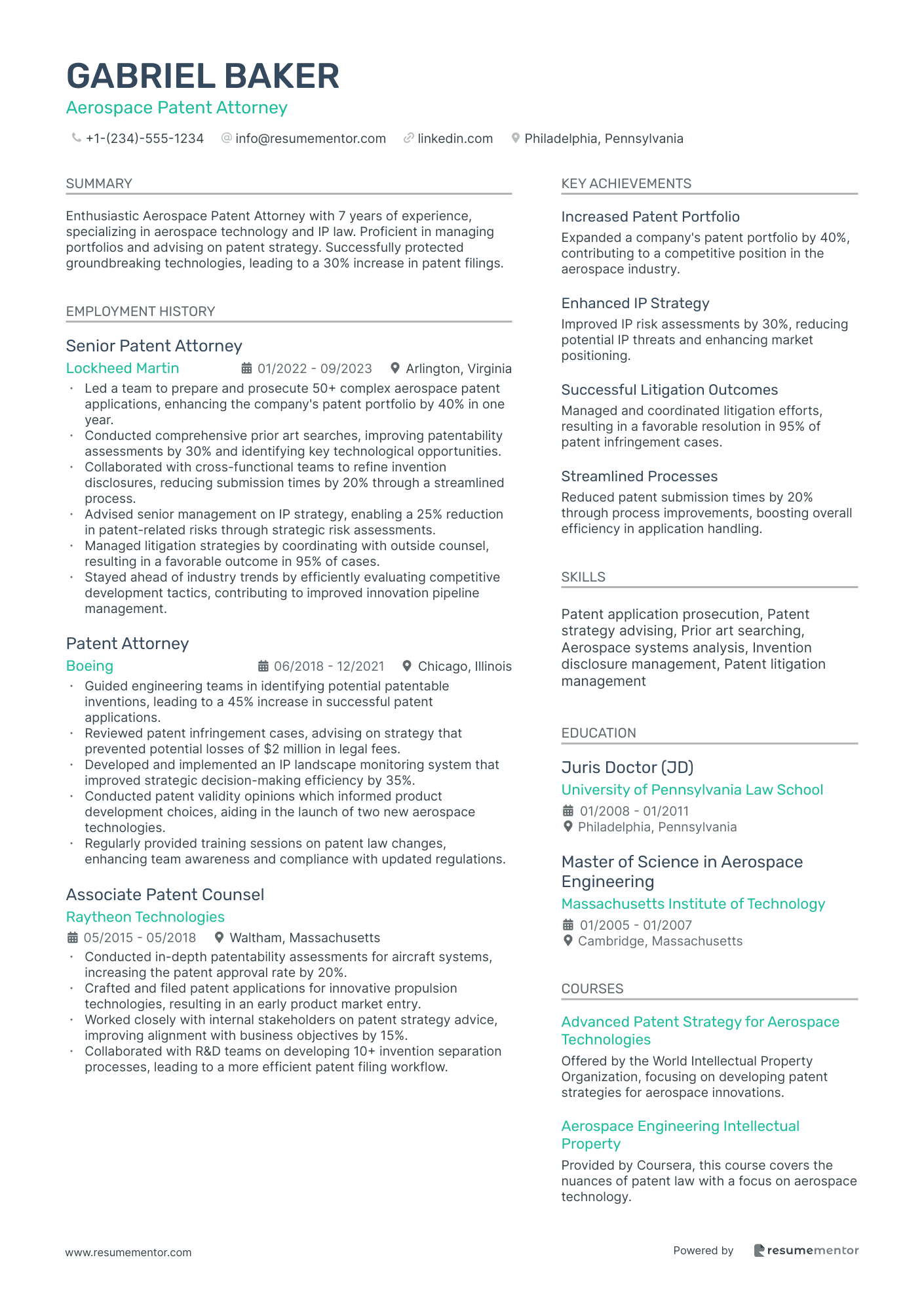
Aerospace Patent Attorney
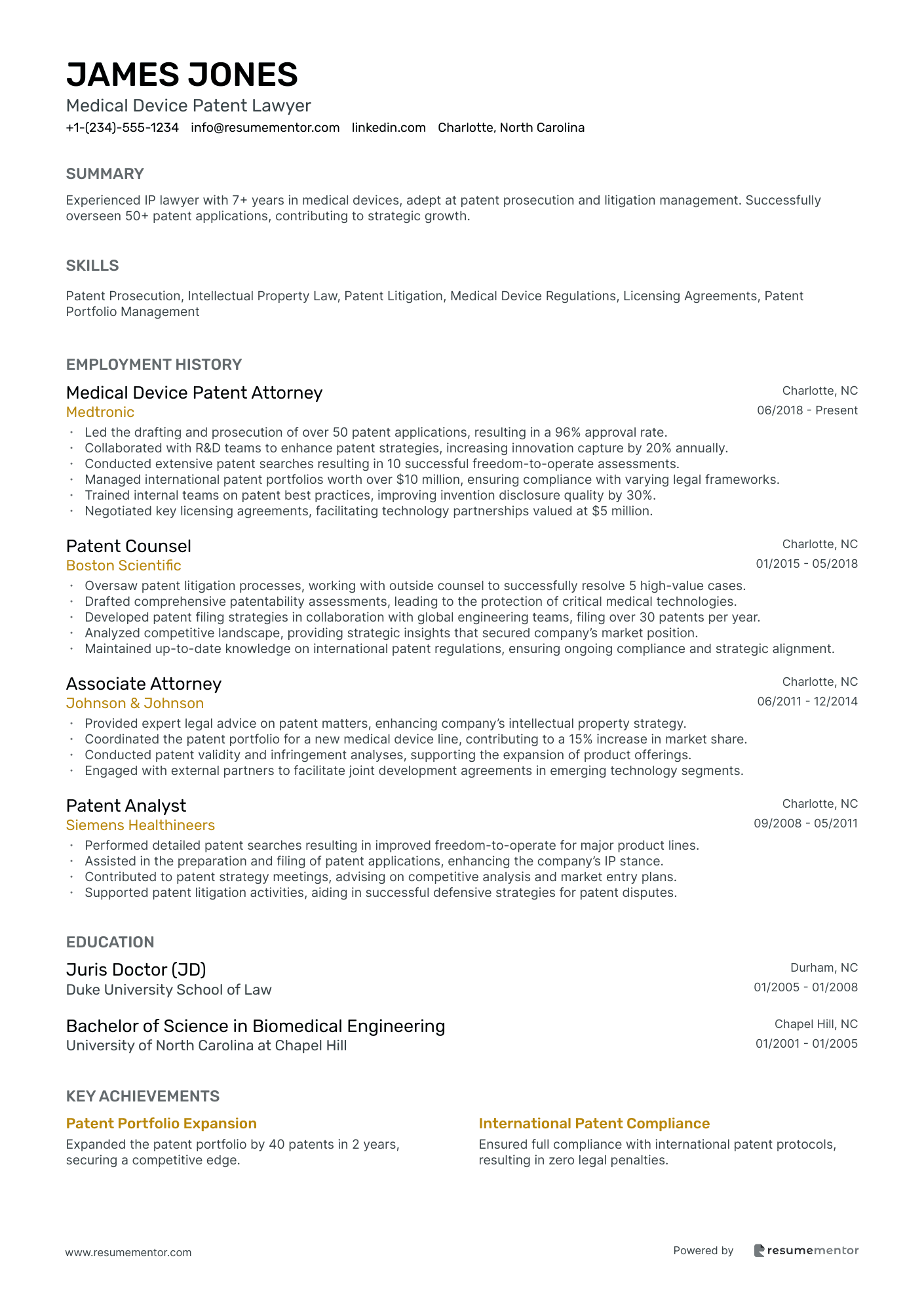
Medical Device Patent Lawyer

Software Patent Attorney resume sample
- •Led a team of 5 patent agents to increase firm's software patent prosecution success rate by 15%.
- •Drafted and prosecuted over 100 patent applications, securing protection in 98% of cases.
- •Developed comprehensive IP strategies tailored to technology clients, resulting in a 20% growth in patent portfolio size.
- •Mentored junior attorneys, enhancing team productivity by 25% through targeted training and guidance.
- •Managed high-stakes patent litigation cases, achieving favorable rulings in over 90% of disputes.
- •Contributed to strategic licensing negotiations, significantly increasing revenue streams by 30%.
- •Conducted detailed patentability assessments for Fortune 500 clients, enhancing protection coverage by 40%.
- •Worked closely with inventors and technical teams to distill complex software innovations into 85 patent filings.
- •Developed IP litigation strategies, winning $50 million in damages for clients across multiple high-value disputes.
- •Successfully executed freedom-to-operate analyses for emerging software products, mitigating potential patent risks.
- •Presented patent strategy seminars, increasing client engagement and understanding of IP rights by 60%.
- •Secured multiple high-profile patents for startup tech companies, establishing foundational IP assets.
- •Managed simultaneous patent prosecutions, increasing efficiency by 20% and meeting all critical deadlines.
- •Facilitated cross-departmental collaborations to articulate intricate software innovations, fostering patentable ideas.
- •Advised clients on IP portfolio development, leading to a 15% increase in their IP holdings and valuation.
- •Contributed to 50+ patent filings, enhancing client patent portfolios in areas of emerging software technologies.
- •Performed due diligence for major technology mergers, ensuring acquisition of key patent rights.
- •Bolstered firm's presence in software IP litigation, collaborating with senior attorneys on decisive cases.
- •Designed training sessions for junior staff, streamlining firm's internal patent review processes by 10%.
Telecommunications Patent Attorney resume sample
- •Managed a team handling over 200 telecommunications patents, improving the company's intellectual property strategy by 30% in efficiency.
- •Drafted and prosecuted high-stakes patent applications, increasing successful patent filings by 25% within 12 months.
- •Conducted in-depth prior art searches, reducing potential infringement litigation costs by an estimated $2 million.
- •Advised on and negotiated licensing agreements, leading to a 20% increase in licensing revenue for telecommunications technologies.
- •Collaborated with cross-functional teams to identify patentable innovations, resulting in 15 new patent applications annually.
- •Led patent litigation strategies with outside counsel, enhancing our legal defense approach and saving $1.5 million in potential losses.
- •Directed a portfolio of 150+ patents, helping to secure a 40% increase in portfolio value through strategic management.
- •Successfully executed freedom-to-operate analyses that prevented legal disputes, saving the company approximately $500,000.
- •Provided expert legal counsel on transactional deals, resulting in improved telecommunications contract agreements by 15%.
- •Developed and implemented a patent filing strategy in emerging markets, leading to a 10% growth in patent coverage.
- •Represented the company in collaborative patent strategies, effectively settling 3 disputes with a favorable outcome.
- •Assisted in drafting 100+ patent applications, enhancing application approval rates by 15% within a two-year period.
- •Performed thorough legal evaluations on patentability, protecting company interests by identifying key patentable innovations.
- •Acted as a liaison between engineers and legal teams to optimize patent creation processes, increasing productivity by 10%.
- •Delivered workshops on patent law changes, educating colleagues and updating procedures to align with the latest legal standards.
- •Collaborated in patent drafting and filing, contributing to a 20% increase in Telecom patent applications success rate.
- •Conducted regular patent infringement assessments, ensuring compliance and minimizing legal risks for telecommunications products.
- •Supported attorneys in litigation processes, enhancing the company's litigation outcomes through strategic case analysis.
- •Engaged with R&D teams to harness new patent opportunities, leading to the identification of 10 potential patent projects.
Electronics Patent Lawyer resume sample
- •Spearheaded multiple successful patent litigation cases in the electronics domain, achieving favorable judgments that safeguarded innovative technologies for our clients.
- •Developed and implemented comprehensive strategies for patent prosecution, resulting in 95% acceptance rate for electronic patent applications.
- •Collaborated with cross-functional engineering teams to identify and secure IP protection for over 50 electronic innovations.
- •Trained a team of five junior attorneys, significantly improving patent application efficiency and prosecution quality within the team.
- •Conducted detailed IP landscape analyses for international clients, identifying opportunities and risks, contributing to 20% growth in client portfolio.
- •Handled negotiation of complex licensing agreements generating $5 million in revenue for clients through effective IP strategies.
- •Advised on pre-litigation strategies for electronic inventions, which decreased potential lawsuit exposures by 30%.
- •Drafted and prosecuted over 150 patent applications in the electronics sector, contributing significantly to a robust client patent portfolio.
- •Led extensive freedom-to-operate analyses, averting potential patent infringement suits for top-tier electronics clients.
- •Initiated patent training workshops, enhancing the patent knowledge and readiness of legal support staff.
- •Represented clients in numerous international patent litigations, resulting in successful resolutions and settlements in 90% of cases.
- •Managed complex patent prosecution processes, leading to an increase in first-action allowances for electronic inventions by 40%.
- •Conducted in-depth patent searches and analyses to address client-specific IP issues in the technology sector.
- •Drafted comprehensive patentability and infringement opinions, supporting strategic decision-making for high-profile electronics clients.
- •Participated in drafting settlement and license agreements that resolved major IP disputes, effectively balancing client rights and risks.
- •Collaborated with research and development teams to design circuit boards, resulting in patents for three pioneering electronic devices.
- •Developed technical documentation that improved production efficiency and reduced failure rates by 20%.
- •Engaged with cross-functional teams to ensure product compliance with industry standards, leading to successful global product launches.
- •Analyzed and improved circuit design, enhancing product performance and contributing to a 15% increase in R&D efficiency.
Chemical Patent Attorney resume sample
- •Successfully led a team that reduced patent portfolio litigation by 20%, enhancing company market position.
- •Oversaw the preparation and prosecution of over 150 patent applications in the chemical sector with a 90% approval rate.
- •Collaborated with research and development teams resulting in the identification of three innovative chemical processes now under patent protection.
- •Implemented legal strategies that decreased patent infringement cases by 25%, safeguarding the company's IP assets.
- •Negotiated complex IP-related contracts resulting in a 15% increase in licencing revenue.
- •Presented successful freedom-to-operate analyses that avoided potential IP conflicts, ensuring smooth product launches in international markets.
- •Managed patent portfolios in emerging markets, which led to a 10% increase in market share.
- •Drafted and prosecuted 100+ chemical and pharmaceutical patent applications with a focus on sustainable technologies.
- •Conducted thorough prior art searches that resulted in a comprehensive analysis for patent landscape reports.
- •Negotiated licensing agreements that added $2.5M in revenue to the company.
- •Supported litigation efforts in five high-stakes patent infringement cases with positive outcomes for the corporation.
- •Played a key role in a project that increased patent approval rates by 15% through strategic prosecution methodologies.
- •Conducted freedom-to-operate analyses and provided strategic recommendations that led to a 20% reduction in potential IP risks.
- •Collaborated in developing innovative strategies that successfully expanded the company's IP portfolio.
- •Represented the company in international patent office inquiries, achieving favorable outcomes in all cases handled.
- •Conducted detailed patentability analyses that supported the development of new products across diverse chemical domains.
- •Assisted in conducting over 50 freedom-to-operate studies to guide product development teams.
- •Contributed to the drafting of patent applications that significantly enhanced IP protection in strategic markets.
- •Engaged in patent portfolio assessments that resulted in a streamlined IP portfolio, reducing maintenance costs by 18%.
Mechanical Patent Lawyer resume sample
- •Led a team of 5 lawyers in managing a portfolio of over 120 patent cases, achieving a 90% success rate in patent grants.
- •Developed comprehensive patent strategies for mechanical innovations, reducing overlaps by 30% through detailed landscape analysis.
- •Mentored junior attorneys in drafting patent applications, boosting filing efficiency by 25% within the team.
- •Collaborated with engineering teams to draft over 70 patents, resulting in a 20% increase in client retention year-over-year.
- •Spearheaded client outreach initiatives that expanded the patent practice, increasing firm revenue by 15% annually.
- •Represented clients in 8 high-stakes patent infringement litigations, succeeding in favorable settlements in 6 cases.
- •Drafted and filed over 100 patent applications specializing in mechanical engineering, ensuring a high-quality success rate of 85%.
- •Conducted 150 prior art searches, substantially decreasing client risks by 40% through meticulous freedom-to-operate analyses.
- •Liaised with clients to convert complex mechanical concepts into concise patent claims, enhancing simplicity and protective breadth.
- •Assessed patent validity in over 40 cases, delivering strategic guidance that resulted in strengthened patent claims.
- •Participated in industry conferences, contributing to a 20% network growth and expanding the firm's strategic partnerships.
- •Analyzed 90 invention disclosures, identifying innovative technologies and contributing to a 15% increase in patent filing success.
- •Executed detailed infringement assessments, providing legal opinions that helped clients avoid potential litigation in 10 instances.
- •Collaborated in preparing 50 legal opinions on patent strategies, delivering strategic advice to clients tailored to their specific needs.
- •Enhanced patent application processes by integrating new IT tools, improving filing efficiency by 20% in the department.
- •Assisted senior attorneys with 60 patent filings, developing foundational skills in drafting and office action responses.
- •Provided support in case preparation, contributing to successful outcomes in 12 IP litigations through meticulous document management.
- •Performed extensive legal research on mechanical patents, enhancing the team's knowledge base and supporting ongoing cases.
- •Participated in direct consultations with engineers, enhancing claim precision and patent quality in various client engagements.
Aerospace Patent Attorney resume sample
- •Led a team to prepare and prosecute 50+ complex aerospace patent applications, enhancing the company's patent portfolio by 40% in one year.
- •Conducted comprehensive prior art searches, improving patentability assessments by 30% and identifying key technological opportunities.
- •Collaborated with cross-functional teams to refine invention disclosures, reducing submission times by 20% through a streamlined process.
- •Advised senior management on IP strategy, enabling a 25% reduction in patent-related risks through strategic risk assessments.
- •Managed litigation strategies by coordinating with outside counsel, resulting in a favorable outcome in 95% of cases.
- •Stayed ahead of industry trends by efficiently evaluating competitive development tactics, contributing to improved innovation pipeline management.
- •Guided engineering teams in identifying potential patentable inventions, leading to a 45% increase in successful patent applications.
- •Reviewed patent infringement cases, advising on strategy that prevented potential losses of $2 million in legal fees.
- •Developed and implemented an IP landscape monitoring system that improved strategic decision-making efficiency by 35%.
- •Conducted patent validity opinions which informed product development choices, aiding in the launch of two new aerospace technologies.
- •Regularly provided training sessions on patent law changes, enhancing team awareness and compliance with updated regulations.
- •Conducted in-depth patentability assessments for aircraft systems, increasing the patent approval rate by 20%.
- •Crafted and filed patent applications for innovative propulsion technologies, resulting in an early product market entry.
- •Worked closely with internal stakeholders on patent strategy advice, improving alignment with business objectives by 15%.
- •Collaborated with R&D teams on developing 10+ invention separation processes, leading to a more efficient patent filing workflow.
- •Advised on intellectual property strategies that enhanced portfolio management effectiveness by 25% within two years.
- •Prepared and managed patent applications, maintaining a 90% success rate in patent approvals through rigorous application processes.
- •Executed prior art searches for avionics patents, guiding engineering teams in refining invention disclosures effectively.
- •Played a pivotal role in cross-disciplinary meetings to clarify IP issues, leading to a 50% reduction in infringement risks.
Medical Device Patent Lawyer resume sample
- •Led the drafting and prosecution of over 50 patent applications, resulting in a 96% approval rate.
- •Collaborated with R&D teams to enhance patent strategies, increasing innovation capture by 20% annually.
- •Conducted extensive patent searches resulting in 10 successful freedom-to-operate assessments.
- •Managed international patent portfolios worth over $10 million, ensuring compliance with varying legal frameworks.
- •Trained internal teams on patent best practices, improving invention disclosure quality by 30%.
- •Negotiated key licensing agreements, facilitating technology partnerships valued at $5 million.
- •Oversaw patent litigation processes, working with outside counsel to successfully resolve 5 high-value cases.
- •Drafted comprehensive patentability assessments, leading to the protection of critical medical technologies.
- •Developed patent filing strategies in collaboration with global engineering teams, filing over 30 patents per year.
- •Analyzed competitive landscape, providing strategic insights that secured company’s market position.
- •Maintained up-to-date knowledge on international patent regulations, ensuring ongoing compliance and strategic alignment.
- •Provided expert legal advice on patent matters, enhancing company’s intellectual property strategy.
- •Coordinated the patent portfolio for a new medical device line, contributing to a 15% increase in market share.
- •Conducted patent validity and infringement analyses, supporting the expansion of product offerings.
- •Engaged with external partners to facilitate joint development agreements in emerging technology segments.
- •Performed detailed patent searches resulting in improved freedom-to-operate for major product lines.
- •Assisted in the preparation and filing of patent applications, enhancing the company’s IP stance.
- •Contributed to patent strategy meetings, advising on competitive analysis and market entry plans.
- •Supported patent litigation activities, aiding in successful defensive strategies for patent disputes.
As a patent attorney, your resume is more than a list of jobs—it's your professional blueprint, conveying your unique blend of legal skills and technical knowledge. Balancing this expertise can be tough, as many attorneys struggle with expressing their skills clearly and concisely. To stand out in a competitive job market, your resume must clearly communicate your legal and technical abilities, capturing the attention of busy hiring managers.
In patent law, just like with patents that embody innovation and clarity, your resume should showcase your innovative approach and articulate your expertise succinctly. This is where using a resume template becomes beneficial. A good template offers the structure needed to keep your qualifications at the forefront and maintains a polished, professional appearance.
This structure allows you to focus on crafting powerful content without the added stress of formatting, ensuring that nothing important gets lost in the process. Presenting your skills effectively as a patent attorney can significantly impact your career opportunities, paving the way for engaging with future employers. As you refine your resume, remember—it’s your personal blueprint, representing you uniquely and effectively.
Key Takeaways
- Selecting the right resume format, such as reverse chronological order with modern fonts, is crucial for effectively showcasing your most recent achievements and maintaining a professional appearance.
- Your patent attorney resume should emphasize legal and technical expertise, clearly communicating your skills to stand out in a competitive job market.
- The experience section of your resume should highlight quantifiable achievements, demonstrating your value through past successes and using action verbs to engage recruiters.
- Incorporating a skills section that lists relevant patent law and interpersonal skills can enhance your resume, making it easier for employers and software to recognize your capabilities.
- Including sections like education, certifications, language proficiency, and extracurricular activities can provide a comprehensive view of your qualifications and personal attributes, enriching your overall professional profile.
What to focus on when writing your patent attorney resume
A patent attorney resume should seamlessly convey your legal expertise and IP knowledge, emphasizing your ability to protect valuable inventions. Recruiters must quickly grasp your qualifications, experience, and specific skills relevant to patent law.
How to structure your patent attorney resume
- Contact Information: Ensure your full name, phone number, email address, and LinkedIn profile link are included, making it simple for recruiters to reach you—these details lay the groundwork for your professional introduction and are crucial for initial contact.
- Professional Summary: Craft a concise overview of your IP expertise, highlighting legal accomplishments and notable achievements in patent litigation or prosecution, which sets the tone for your resume—use this section to grab the recruiter's attention and make them eager to learn more about your background.
- Work Experience: Present your roles in reverse chronological order, focusing on practice areas such as patent prosecution, IP litigation, or technology transfer—specific examples of cases or projects you’ve handled can illustrate your impact and contributions, demonstrating your practical expertise to the recruiter.
- Education: Highlight your law degree (JD) and relevant undergraduate degrees, particularly if they include technical fields such as engineering or science—this section connects your educational background to your legal practice, underscoring your specialized knowledge in areas pertinent to patent law.
- Certifications and Licenses: Clearly list your bar admission(s) and, if applicable, certifications like USPTO registration—this section reinforces your authority and credibility in patent law, showing the recruiter you have all necessary qualifications to practice effectively.
Adding sections such as "Professional Affiliations" or "Published Works" can enhance your resume, showcasing your deeper involvement in the legal and IP communities. Up next, we'll cover each section more in-depth, focusing on resume formatting essentials.
Which resume format to choose
Creating a standout patent attorney resume starts with selecting the appropriate format. The reverse chronological format is ideal because it emphasizes your most recent and relevant experience. This format aligns with the legal industry's preference for seeing up-to-date achievements prominently, allowing employers to quickly assess your latest contributions to the field of patent law.
Choosing the right font also plays a crucial role in how your resume is perceived. Opt for modern, legible fonts like Raleway, Lato, and Montserrat. These fonts not only enhance readability but also convey a sense of professionalism and attention to detail, qualities that are essential in the legal profession.
Once your format and font are selected, the next step is to save your resume as a PDF. PDFs maintain your formatting exactly as you designed it, which is crucial for preserving the integrity of your document. This ensures that employers see your resume as you intended, regardless of the device or software they use to view it.
Setting one-inch margins on all sides of your resume provides a balanced and organized appearance. Ample margins contribute to a clean layout, making your information easy to scan and digest. This clarity is important, as it allows potential employers to quickly grasp your qualifications and experience without feeling overwhelmed by text.
By carefully considering these elements, you create a resume that effectively showcases your skills and experience as a patent attorney, making a strong impression on potential employers.
How to write a quantifiable resume experience section
The experience section of your patent attorney resume lets you highlight your career accomplishments and expertise. It's the place to show your achievements and the positive impact you’ve made in past roles. Start with your most recent experience and work backward, ensuring a clear structure. This section helps persuade potential employers by giving them concrete evidence of your skills and successes. Focus on roles relevant to the job you’re applying for, rather than listing every job you’ve held. Aim to go back 10–15 years, concentrating on positions where you made significant contributions. Use action verbs like "led," "secured," "managed," or "negotiated" to highlight your proactive involvement. Tailoring your achievements to match the employer's specific needs and skills can make your resume stand out even more.
- •Managed a portfolio with over 200 patents, boosting client retention by 25%.
- •Led a team to secure $5 million in licensing deals, raising annual revenue by 15%.
- •Advised on patent strategy for new technologies, cutting clients' legal risks by 40%.
- •Streamlined patent filing processes, reducing approval time by 30%.
The experience section is effective because it connects your roles with clear, quantifiable achievements, showing how you added value to past employers. Each bullet point tells a coherent story of success, using metrics to provide a concrete sense of impact. The active language, like "managed," "led," and "advised," keeps the narrative engaging and highlights your involvement in delivering results. A clean structure with job titles, locations, and dates ensures a professional look that is easy to follow. By tailoring your resume to align with specific job ads and matching your successes with employer needs, you not only create a compelling narrative but also demonstrate your ability to meet their expectations seamlessly.
Growth-Focused resume experience section
A growth-focused patent attorney resume experience section should effectively capture your achievements and the impact you’ve made. Select a distinct focus for each work entry, whether it highlights a project, a successful case, or a standout contribution to your firm. Describe your role and accomplishments in a way that showcases the benefits you brought to both yourself and your organization. By focusing on outcomes that align with the firm’s goals, you depict yourself as a valuable team member.
To do this, use active language and quantify results wherever you can to convey the significance of your work. Discuss any innovative methods you employed and their role in achieving successes. It's important to highlight teamwork aspects, especially if you led teams or collaborated with clients, reinforcing your role as a forward-thinking problem solver who consistently helps move the firm forward.
Patent Attorney
Innovate Legal Solutions
January 2020 - Present
- Successfully defended a major client in a multi-million dollar patent infringement case, resulting in a favorable settlement.
- Developed a novel litigation strategy that improved case outcomes by 30%.
- Led cross-functional team meetings to streamline case prep, saving 20% of time.
- Secured expert witness testimony that strengthened our legal position.
Innovation-Focused resume experience section
An innovation-focused patent attorney resume experience section should begin by showcasing your ability to drive new ideas and foster creativity within your team. Highlight how these innovations made a positive impact on your firm or clients, and use strong action verbs like "developed," "initiated," and "enhanced" to illustrate your leadership and proactive approach. This emphasis on new strategies and solutions should clearly demonstrate how you propelled progress through tackling complex issues with fresh ideas, making sure your contributions are unforgettable.
Connect these ideas in your bullet points by focusing on measurable achievements and the specific intellectual property challenges you overcame. Describe how your innovative efforts led to successfully securing patents or optimizing patent portfolios, directly benefiting clients or the company. Include outcomes like reduced costs or enhanced legal strategies, creating a clear link between your creative solutions and tangible successes. Always focus on how your problem-solving skills and innovative thinking provided significant value, reinforcing the impact of your work.
Senior Patent Attorney
Innovative Law Group
June 2017 - Present
- Pioneered a new patent analysis tool that reduced research time by 30%.
- Led a cross-functional team to develop a client-focused patent portfolio strategy, increasing client satisfaction by 15%.
- Created a novel approach to patent filing that increased successful filings by 20%.
- Enhanced collaboration between legal and technical teams, resulting in more comprehensive patent assessments.
Customer-Focused resume experience section
A customer-focused patent attorney resume experience section should emphasize how you nurture strong client relationships while achieving strategic results. Begin with a clear title that encapsulates your work, and follow with engaging details that demonstrate your talent for solving problems and aligning with client needs. Describe how you effectively communicate complex concepts and provide guidance that supports clients’ business objectives.
Highlight your achievements in a way that showcases your dedication to client satisfaction. Use bullet points to detail your successes, such as enhancing client engagement or filing patents that drive client growth. By demonstrating concrete outcomes, like improved satisfaction scores or increased patent approvals, you convey your value and make your resume compelling.
Senior Patent Attorney
InnovateIP Law Group
May 2017 - June 2023
- Developed clear patent strategies that aligned with client business goals, increasing client ROI by 15%.
- Communicated complex patent language in understandable terms, improving client satisfaction scores by 20%.
- Collaborated with clients to identify market opportunities, resulting in the filing of 50 successful patents.
- Enhanced client engagement by organizing regular check-ins, leading to a 30% increase in client retention.
Achievement-Focused resume experience section
A patent attorney-focused resume experience section should highlight your key accomplishments and demonstrate the positive impact you've had throughout your career. Begin by sharing the highlights of your work, such as the successful granting of patents, the resolutions of complex legal issues, or the collaborations with major firms. When writing about these achievements, make sure to explain what you did, how you did it, and the benefits that arose from your work. Including numbers where possible can make your achievements stand out even more.
Each bullet point should start with a strong action verb to emphasize your role in these successes. Be precise and avoid generic statements, ensuring that your entries clearly reflect your expertise and dedication. By tailoring your resume to align with the language and requirements of the job you're targeting, you can better showcase how your experience can bring value to potential employers. With this approach, you will clearly demonstrate your ability to generate excellent results that can drive success in their company.
Senior Patent Attorney
InnovateIP Law Firm
January 2015 - Present
- Coordinated the successful filing of over 150 patent applications, achieving a 95% grant rate.
- Led cross-functional teams to prepare patent documentation, boosting filing efficiency by 25%.
- Cut patent rejection rate by 30% through detailed prior art searches and strategic claim drafting.
- Teamed up with clients to develop intellectual property strategies, strengthening their patent portfolios.
Write your patent attorney resume summary section
A results-focused resume summary for a patent attorney should be clear, engaging, and tailored to the job. This section is your opportunity to make a strong first impression and capture the recruiter's interest. Start with action-packed words to highlight your strengths, such as your experience in patent law. Consider using an example like this:
This summary captures attention by using dynamic language and highlighting specialized skills and experiences. Mentioning specific achievements gives substance to your summary and demonstrates credibility. When you describe yourself, match these details to the job you're applying for, emphasizing traits that reflect the role's demands. Adding a note about your enthusiasm for the field gives your application a personal touch that can make it stand out. Understanding the nuances between a resume summary and a resume objective is crucial. A summary is great for those with a wealth of experience, showcasing what you've accomplished. In contrast, an objective outlines your career aspirations and is more suited for people pivoting careers. Similarly, a resume profile provides a broader view than a summary, while a summary of qualifications lists key skills in bullet points. Picking the right format based on your experience level and career goals can enhance your resume’s impact.
Listing your patent attorney skills on your resume
A skills-focused patent attorney resume should highlight your professional strengths while seamlessly connecting your hard and soft skills throughout the document. When crafting your resume, you can choose to create a dedicated skills section or integrate your abilities into your experience and summary. Both approaches effectively showcase your strengths and soft skills, such as communication and problem-solving, which contribute to better work interactions.
Hard skills, including patent law expertise and application drafting, are specific abilities essential for handling technical tasks. These skills and strengths should serve as key terms within your resume, ensuring you capture the attention of employers and resume-scanning software alike.
Consider this example of a standalone skills section in JSON format:
This setup works well as it delivers a clear and direct list of your skills, helping both employers and systems recognize your capabilities. Structuring your skills in this way makes your expertise easily understandable.
Best hard skills to feature on your patent attorney resume
Your hard skills should portray your capacity to navigate legal complexities and technical challenges. These skills demonstrate your technical expertise and legal acumen:
Hard Skills
- Patent Law Expertise
- Patent Application Drafting
- Patent Searches and Analysis
- Intellectual Property Strategy
- Patent Prosecution
- Patent Litigation
- Technical Writing
- Legal Research
- Licensing Agreements
- Regulatory Compliance
- Patent Portfolio Management
- Intellectual Property Auditing
- Patent Infringement Analysis
- Design Patent Drafting
- International Patent Filings
Best soft skills to feature on your patent attorney resume
Soft skills reflect your interpersonal and problem-solving abilities, showing you can collaborate effectively and manage challenges:
Soft Skills
- Communication
- Critical Thinking
- Problem-Solving
- Negotiation
- Attention to Detail
- Time Management
- Client Relationship Management
- Adaptability
- Team Collaboration
- Strategic Planning
- Conflict Resolution
- Creative Thinking
- Decision-Making
- Multitasking
- Persuasion
How to include your education on your resume
The education section of your resume is an important part when applying for a job as a patent attorney. It should be tailored specifically to highlight relevant education that the prospective employer would find valuable. Only include degrees and educational achievements directly related to your career, omitting any irrelevant ones. When listing your degree, clearly state the degree type followed by the major, if applicable. Including your GPA can be beneficial, especially if it's above a 3.0, but it's not mandatory. If you graduated with honors, such as cum laude, definitely mention it. On your resume, clearly show both the degree and the institution name, ensuring the dates of attendance are also included. This provides the hiring manager with insight into your academic timeline.
Here’s a wrong example:
- •Note key learnings, experience and skills gained relevant to the job.
Now, here's a right example:
- •Graduated Cum Laude
The second example effectively showcases a degree relevant to the role of a patent attorney. It emphasizes strong academic performance with a GPA of 3.8, and the distinct honor of graduating cum laude from a prestigious law school. It helps create a strong impression, showing that you have the necessary education and achievements for the role.
How to include patent attorney certificates on your resume
Adding a certificates section to your patent attorney resume is crucial. List the name of the certificate. Include the date you received it. Add the issuing organization. This section highlights your credentials and expertise to potential employers. Certificates can also be included in the resume header after your name and contact details. For example: "John Doe, Registered Patent Attorney, USPTO, EPO Certified".
This example is excellent because it clearly lists relevant certifications for a patent attorney. The certificates demonstrate specialized knowledge and verified credentials. Each item includes the title and issuing organization, ensuring clarity. It shows your dedication to continuous learning and staying updated in the field. This attention to detail is highly valued in the legal profession. Such credentials set you apart from candidates who do not hold these certifications.
Extra sections to include in your patent attorney resume
Crafting a standout resume as a patent attorney requires you to highlight not only your technical skills but also a broad range of personal attributes and extracurricular activities. Including unique sections can set your resume apart and make a strong impression on potential employers.
Language section — Show proficiency in multiple languages to convey your ability to work with international clients. Emphasize fluency levels and any legal terminology mastery.
Hobbies and interests section — Demonstrate well-roundedness through varied interests that reveal skills useful in a legal setting, such as critical thinking. Highlight activities like chess, writing, or public speaking.
Volunteer work section — Illustrate commitment to community and personal growth by listing relevant volunteer experiences. Mention work that fosters skills such as teamwork and leadership.
Books section — Highlight continuing education and staying updated with legal trends by listing influential books you’ve read. Focus on those that improved your legal expertise or provided insights into patent law.
Integrating these sections into your resume helps potential employers gain a comprehensive view of your capabilities and personality. It enriches your profile and conveys a more holistic professional image.
In Conclusion
In conclusion, crafting a compelling resume as a patent attorney is vital to showcasing your unique skills and expertise to prospective employers. By clearly highlighting your legal acumen alongside your technical knowledge, you can set yourself apart in a competitive job market. Utilizing a structured resume format and selecting modern, legible fonts ensures that your resume is both professional and easy to read. Including quantifiable achievements within your experience section boosts the credibility of your skills and demonstrates your impact in previous roles. Furthermore, a well-written summary section can immediately capture the attention of hiring managers by succinctly outlining your strengths and accomplishments. Remember to tailor your resume to emphasize both hard and soft skills that are relevant to the patent law field. Including details about your education and certifications provides additional proof of your qualifications. Finally, consider adding extra sections such as language proficiency, volunteer work, and personal interests to present a well-rounded professional profile. Employing these strategies will enhance your resume, making it a powerful tool for advancing your career as a patent attorney. By doing so, you present yourself as a comprehensive candidate ready to take on new challenges and contribute to the success of prospective employers.
Related Articles

Continue Reading
Check more recommended readings to get the job of your dreams.
Resume
Resources
Tools
© 2026. All rights reserved.
Made with love by people who care.

